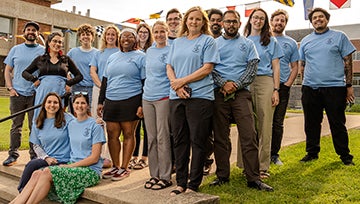At the New England Estuarine Research Society meeting in Freeport, Maine, several alumni ventured out to a local salt marsh with colleagues and new GSO Professor Erin Peck.
Compiled by Veronica M. Berounsky, Ph.D. ’90
Share Your News With Aboard GSO1970s | 1980s | 1990s | 2000s | 2010s | 2020s | In Memoriam
The Annual Ceremony
On Friday afternoon, May 17, GSO celebrated 31 graduates of the 2023-24 academic year at a ceremony organized by GSO’s Admissions Advisor Meredith Clark and Associate Dean of Academic & Student Affairs Rob Pockalny, Ph.D. ’91. As usual, each degree recipient was recognized for their accomplishments and received a special, GSO-graduate t-shirt.
1970s
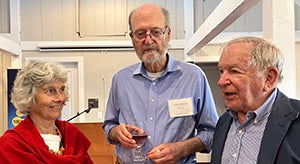
Arthur G. Gaines, Ph.D. ’75, and his wife Jennifer came to campus for a reunion and caught up with classmate Sheldon Pratt (center). Arthur also left a note in the boat for the late Don Gordon, M.S. ’64, founder of the annual Boat Burning event.
1980s
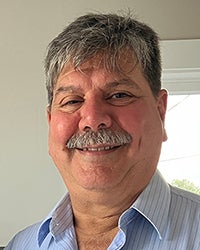
The graduate who traveled the furthest distance for the GSO reunion this year was Charles Mandeville ’81, Ph.D. ’95, who lives in New York state and works for the Alaskan Volcano Observatory.
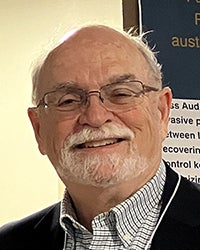
Robert Dwyer, Ph.D. ’80, is vice president of the Pocasset Water Quality Coalition. Bob and others presented a poster entitled “Community Based Implementation of Stormwater Management, Hen Cove, Pocasset, Massachusetts” at the Southeast New England Program Symposium at Roger Williams University.
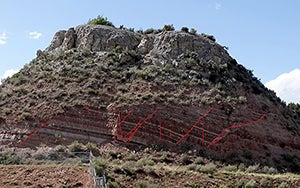
Greg Mead, M.S. ’83, is a geology professor in Gainesville, Fla, and notes, “Florida’s geology is boring when it comes to rocks because we only have about two kinds.” So, he created the first annual Sante Fe College Domestic Study Geology Field Camp to take his students out to national parks in Arizona and Utah.
Jeff Rosen, M.S.’83, reports that he has retired after a 48-year career as an environmental consultant. He is spending his time with his wife Lynne and family in Scituate, Mass., is sailing, swimming and coaching the local YMCA swim team. Jeff says “Life is wonderful!”
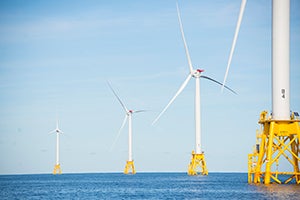
Emeritus Marine Research Scientist Robert D. Kenney, Ph.D. ’84, and two ocean engineers gave a webinar as part of the URI Faculty Hours seminar series about monitoring of whales and other marine mammals near wind farms around the country. He noted “there is zero evidence for any marine mammal dying because of construction, maintenance or operation of a wind farm.”
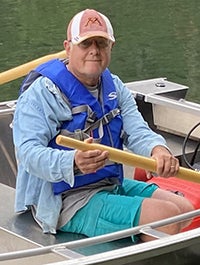
Peter Sorenson, Ph.D.’84, retired last fall after 35 years as a professor of fisheries, wildlife and conservation biology at the University of Minnesota in St. Paul. He founded the marine biology program there as well as the aquatic invasive species research center and mentored over a dozen graduate students while publishing close to 200 articles and chapters on fish pheromones and behavior. He continues there part-time as an emeritus professor as well as an adjunct at the University of British Columbia where he and his wife Gail have an off-the-grid cabin on the Salish Sea.
Many alumni came with their families to the Bay Campus for Science Saturday. They took part in activities under the tents on Knauss Quad, checked on the URI small boats fleet, watched the “volcano” explode, and explored the aquarium’s touch tank. They enjoyed a snack at our special corner for graduates and caught up with host Walter Berry, Ph.D. ’87.
1990s
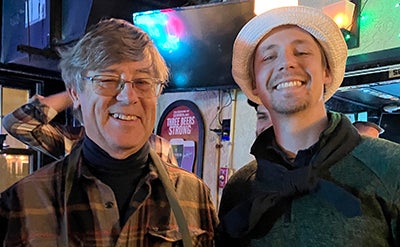
The URI Sea Shanty Social Club started in 2021 as a response to the isolation of the COVID years, and the camaraderie has kept it going. The group now performs at various locations in South County. Club members include GSO graduates Hal Walker, Ph.D. ’91, (left) and Jake Harrington, M.S. ’24.
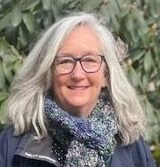
Professor Kathleen Donohue, Ph.D. ’96, was recognized for developing an innovative course with GSO Emeritus Professor Brian Heikes as part of URI’s General Education Program. OCG 200G: Extreme Weather helps students consider the economic, social and personal impacts of weather and extreme weather. events.
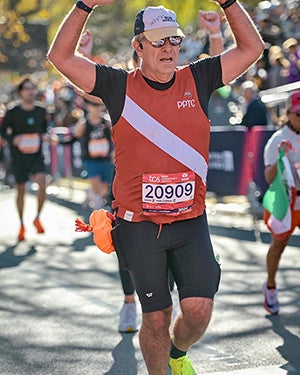
Since he started running 11 years ago, Ed Kearns, Ph.D. ’96, has run over 12,000 miles and recently completed both the Chicago Marathon and the New York City Marathon. When he is not running, Ed is the Chief Science Officer at the First Street Foundation, whose climate risk financial modeling is especially important in discussions about hurricane season and the impact of climate change on homeownership. First Street has supplied data on this topic to several leading national publications.
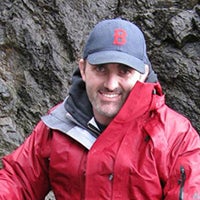
Christopher Reddy, Ph.D. ’98, was recently featured in “Rhode Map,” The Boston Globe email newsletter. In an interview he spoke about his career path, his two recently published books, communicating science and lessons learned (or not) from oil spills.
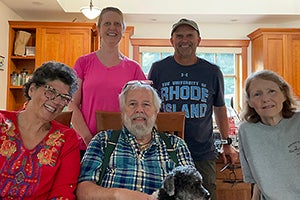
Reminiscing about working and learning with the late GSO Professor Howard Winn in the Marine Building were, standing, Kathy Vigness-Raposa, M.S. ’98, and Kenny Raposa, M.S. ’97, Ph.D. ’00, and seated from left, Cheryl Schroeder, M.S. ’00, Bob Kenney, Ph.D. ’84, and Kathy Duffy, Ph.D. ’99.
2000s
On the night before the 60th Boat Burning, GSO and campus partners hosted a reception for graduates and friends in the Mosby Center. Dean Paula Bontempi, Ph.D. ’01, updated the group about the Ocean Robotics Lab, campus redevelopment, R/V Narragansett Dawn, and new research.
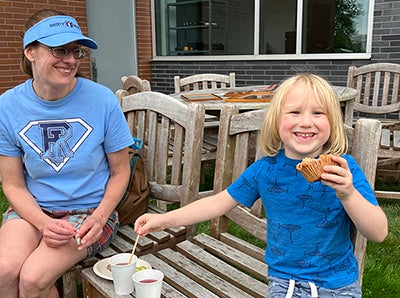
Jessica Dombroski DiNola, M.S. ’04, enjoyed Science Saturday with her son Frank. Jessica has continued her ties with URI as the color guard instructor for the URI Marching Band.
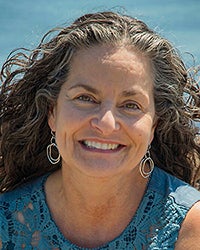
Catalina Martinez, B.S. ’97, GSO M.S. ’00, M.M.A. ’02, M.B.A. ’15, was interviewed for the R.I. Public Broadcasting Service program “Generation Rising” for an episode entitled “Women in STEM Are Making Waves.” Catalina spoke about her career with NOAA and her work to advance justice, equity, diversity and inclusion.
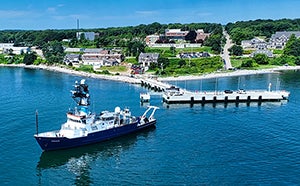
In July, R/V Endeavor was on EN719, a 24 day cruise collecting data for the New England Seamounts Experiment. Working on the project was Magdalena Andres, M.S. ’02, Ph.D. ’09. This photo of Endeavor departing was snapped by Professor Emeritus of Oceanography Steve Carey, Ph.D.’83.
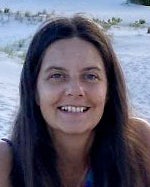
One of the Metcalf Institute’s Annual Public Lecture Series speakers was Regina R. Rodrigues, Ph.D. ’04, a professor of physical oceanography at the Federal University of Santa Catarina in Brazil. On June 13, she spoke virtually on “Implications of Under-researching the South Atlantic for Water Scarcity in South America” and discussed the interactions between climate dynamics and water availability in South America.
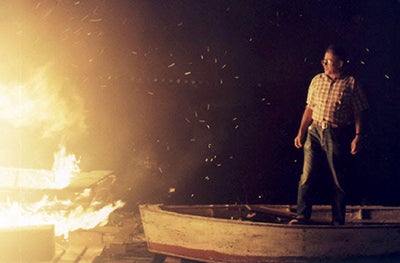
“The recent Anchor Lines email brought back many Boat Burning memories. Thanks for the great flashback. And here’s one more to share from 1999,” wrote Steve Gavlik, Ph.D. ’04.
Bill Woityra, M.S. ’05, was named an International Affairs Fellow with the Council on Foreign Relations. He will soon be serving as attaché and Arctic policy advisor at the U.S. embassy in Ottawa.
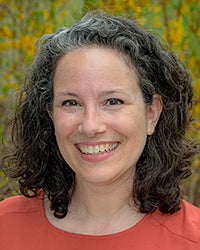
On May 17, Clean Water Action held their annual “Breakfast of Champions” and honored their 2024 R.I. Environmental Champions. Sunshine Menezes, Ph.D. ’05, received the David R. Gerraughty Award for her lifelong dedication to advancing environmental communication and scientific understanding, including 17 years as executive director of the Metcalf Institute at URI.
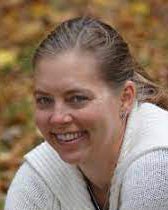
Two graduates were speakers at Capitol Hill Ocean Week (CHOW) last June. Kim Hyde, Ph.D. ’06, spoke in the session “Advancements for Observing our Ocean,” which covered new indicators about ecosystem response to changing ocean conditions, new forecast tools, and new model verification techniques. Catalina Martinez spoke in the session, “The Ocean is Our Ally: Protecting the health, wealth and security of our living planet,” which discussed novel approaches, technologies and training programs that strengthen our alliance with the ocean. The talks and panel discussions are available on the CHOW 2024 website.
Jason Breves, M.S. ’06, is recipient of the prestigious Grace Evelyn Pickford Medal by the International Federation of Comparative Endocrinological Societies. This medal is presented every four years and recognizes outstanding contributions to comparative endocrinology and is considered one of the highest honors for early to mid-career scientists.
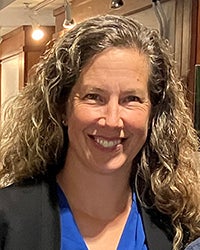
On Sept. 11, the GSO “Bio at Noon” speaker was Robinson (Wally) Fulweiler, M.S. ’03, Ph.D. ’07, who spoke on “Exploring Nitrogen Fixation Across Aquascapes—from inland waters to coastal seas.” She and her colleagues developed a website to keep researchers up to date.
2010s
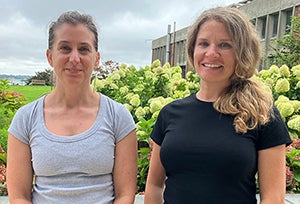
Carey Friedman, Ph.D. ’10, (left) and URI graduate LeAnn Whitney, Ph.D. ’12, were funded to research PFAS in Maine’s Penobscot Bay. While delivering their samples to GSO for processing in August, they gave talks about their career paths which led them to faculty positions at Maine Maritime Academy.
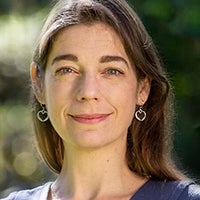
On July 29, Brita J. Jessen, Ph.D. ’16, was appointed the center director for the United States Geological Survey, Woods Hole Coastal and Marine Science Center. She will support the science and products of their coastal and marine hazards and resources program.
2020s
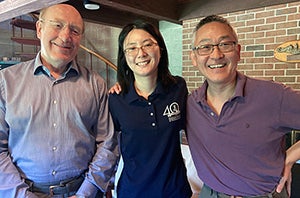
Xuanyu Chen, Ph.D.’20, returned to campus to give a seminar and reunited with her advisors Isaac Ginis, left, and Tetsu Hara. The occasion was special as she graduated during the pandemic and defended her dissertation virtually.
The company founded by Kevin Rosa, Ph.D. ’20, Current Lab, provides professional ocean forecasts for sailors that are updated daily and are used by regattas off Long Island and Block Island, and at the Newport Bermuda Race.
Kristin Huizenga, Ph.D. ’22, and her major professor, Candace Oviatt, Ph.D. ’67, have two peer-review publications on lobsters in Narragansett Bay. Their work shows that a reduced larval population, increased predation by fish and warmer water temperatures all play a role in explaining why the population is decreasing in Narragansett Bay.
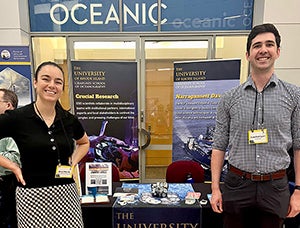
GSO had a booth at Capitol Hill Ocean Week (CHOW) and many graduates, such as Basia Marcks, Ph.D. ’22 and Gabe Rodriguez, M.O. ’22, visited
Shaina Harkins, M.S. ’22, an environmental scientist at the Rhode Island Department of Environmental Management, worked with GSO staff members to have the 2024 Science Saturday event certified as a RIDEM green event.
Since August, there has been an art exhibit organized by Art League RI at Studio Blue in the Coastal Institute titled “The Synergy Project: A Collaboration of Art and Science.” One series is a collaboration by artist Cynthia Beth Rubin, GSO Professor Suzanne Menden-Deuer and Andria Miller, M.S. ’23.
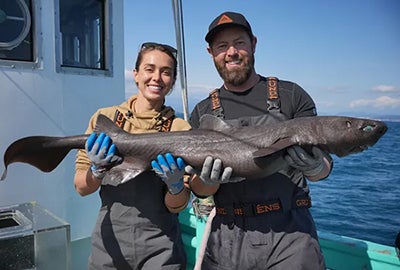
On July 10, Christine de Silva, M.O. ’23, co-hosted, “Alien Sharks: Ghosts of Japan,” on Shark Week on the Discovery Channel. The team found 16 shark species off Japan, including the elusive Japanese angelshark.
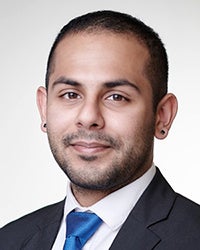
Vitul Agarwal, Ph.D. ’24, is a postdoctoral researcher at the Scripps Institution of Oceanography. He is helping with the cross-border pollution problem by working on a predictive model for human pathogens in San Diego’s coastal waters to improve public health and mitigate economic impact.

A new legislative commission has convened to explore solutions for Rhode Island’s eroding coastline. Emily Hall, M.S. ’23, now the state coastal geologist for the Rhode Island Coastal Resources Management Council, and GSO Dean Paula Bontempi are serving on the commission.
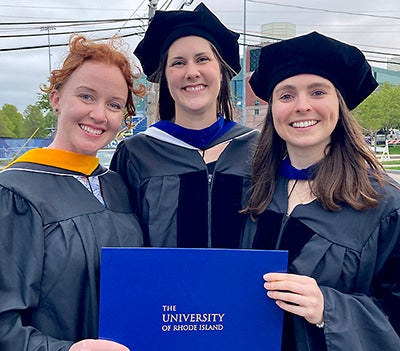
GSO graduates joined with undergraduate and graduate students of the College of the Environment and Life Sciences for a URI Commencement ceremony. GSO Dean Paula Bontempi spoke about how proud she was of the graduates who worked on their degrees through a global pandemic and are expanding our knowledge of ocean science. The GSO commencement speech was given by Victoria Fulfer, M.S. ’19, Ph.D. ’24 (center), noting graduates can “be the light in the dark” of the world and gave a message of hope about shaping a better future.
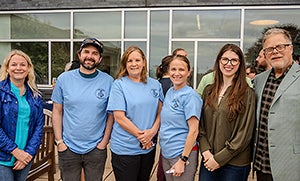
Also in May, GSO online students from around the country came to the Bay Campus for the first time to celebrate completion of their Master of Oceanography degrees. The success of these students is an auspicious start for a new suite of online degree programs designed to enhance careers in ocean-related business, education, government and nongovernment institutions.
Helping Students Succeed
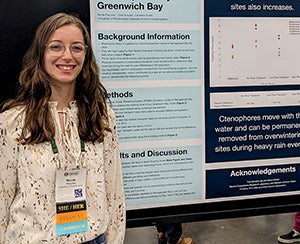
GSO students received awards from the Alum Fund for research supplies, educational experiences, professional development, and scientific conference travel. Some of the funds used to make these awards were donated in honor of Professor Emeritus Michael Pilson. Contributions are still welcome. Gifts for immediate use can be made online at Rhody Now: GSO or by mail to:
URIFAE, Rhody Now: GSO, P. O. Box 1700, Kingston, RI 02881
If you would prefer contributing to an endowment, send an email to GSO’s development contact, Bill Koconis (bkoconis@uri.edu), or give him a call at 401.874.5682. Thank you, our graduates, for providing funds for GSO students.
Dian J. Gifford
A marine research scientist emerita, Dian passed away peacefully August 24, 2024, at her home in New Bedford, Mass., at the age of 76. She was a pioneer in the study of microzooplankton ecology, especially their importance in the diet of calanoid copepods, ctenophores, and other metazoan zooplankton and their overall role in energy flow through marine ecosystems. She supervised students (Peter Garrahan M.S. ’93, Elena Martin, Ph.D. ’00, Lindsay Sullivan, M.S. ’01, Ph.D. ’07) and postdocs (Jeffrey Van Keuren, Rebecca Waggett), took students and others to sea, mentored undergraduates, and worked with colleagues at GSO and elsewhere.
Craig R. Glenn, Ph.D. ’87
Craig was a professor at the University of Hawaii’s Department of Earth Sciences. He passed away on September 5, at the age of 70 due to health problems. At GSO, he was a student of Professor Mike Arthur. Craig spent his early career on modern and ancient paleoproductivity and marine authigenic mineral formation. Later Craig became known worldwide for his pioneering research on submarine groundwater discharge in Hawaii. More recently, he led the Department of Health and Army Corps of Engineering-funded landmark study titled the “Lahaina Groundwater Tracer Study,” which became the basis of a U.S. Supreme Court decision in 2020 about the vital role of groundwater on the health of the nation’s oceans, rivers and lakes.
Donald (Don) Gordon, M.S. ’64
After a brief period of failing health, Don passed away on July 27, at the age of 84. After earning his degree at GSO, he moved to Halifax, Nova Scotia and received his Ph.D. in 1968 from the Institute of Oceanography at Dalhousie University. Don had a distinguished career at the Bedford Institute of Oceanography in Dartmouth, Nova Scotia, as a sea-going research scientist and a well-respected administrator. In his retirement, he wrote on various topics of oceanographic history, including his research cruises on the R/V Trident. He will always be remembered at GSO as the student who, 60 years ago, inaugurated the “boat burning” tradition that welcomes new students. A Celebration of Life was held in Halifax, Nova Scotia, and a recording is available.
Walter J. Gray
Walter died June 23, 2024 at the age of 96. He retired from GSO in July 1989 as director of the Office of Marine Programs, and served the University of Rhode Island in several other capacities. Starting in 1968, he was the director of the New England Marine Resources Information Program and the Marine Advisory Service (part of Rhode Island Sea Grant). In 1975, he became director, Narragansett Bay Campus Division of Marine Resources and Assistant Provost. This division acted as a link between the state’s marine community and the research faculty at URI. Jane Miner, who worked with Walter from 1975 through 1989, notes, “He played a large role in assisting Dean John Knauss with expanding GSO’s footprint on the non-research side of things.” In 1978, Walter received the URI Administrative Excellence Award for his work in this capacity. Walter became director of the Office of Marine Programs, now known as Public Engagement, in June, 1986.
Eric G. Klos
A retired member of the GSO staff, Eric passed away after a brief period of failing health on October 9 in North Kingstown, R.I., at the age of 74. His wife Kathy Beck was by his side. In 2016, Eric was predeceased by his first wife, Mary F. “Mimi” Fox. His career at GSO began in 1972. He helped develop, then operated, the Marine Ecosystem Research Laboratory (MERL) mesocosms for more than two decades (1975-1998). Professor Candace Oviatt, Ph.D.’67, noted “Eric was the mastermind behind field work in Narragansett Bay, dozens of SCUBA dives, and most of the MERL experiments. Throughout his career he managed his teams of scientists, technicians and graduate students with a light touch and formed lasting friendships with many folks. The strong team spirit that he initiated, still permeates MERL activities.” From 1998 until he retired in 2018, Eric was the GSO facilities coordinator. In retirement, he honed his abundant photography skills. There was a Celebration of Life at South Ferry Church, followed by a reception at GSO’s Mosby Center.
Robert Adrian Murchelano, Ph.D.’67
Murchelano passed away on August 24, in Easton, Md., at 90 years old. He was a student of the late Professor David Pratt. He worked for the National Oceanic and Atmospheric Administration in Milford, Conn., Oxford, Md., and West Falmouth, Mass. and also for the Environmental Protection Agency in West Falmouth, Mass. His work on cancer in winter flounder was published in the journal, Science.
Gerald “Jerry” G. Pesch, M.S. ’66, Ph.D. ’72
Jerry passed away on April 24 at 83 years old. He was a student of the late GSO professors Perry Jefferies and Saul Saila. He can be seen in the 1964 photo of the first Boat Burning. He worked at the U.S. E.P.A. Laboratory in Narragansett for 35 years, where he met his wife, Carol. Arthur Gaines, Ph.D. ’75, noted that, as a student, Jerry organized the Jiffy Cruises that sampled at stations throughout West Passage of Narragansett Bay and “for several years the Jiffy Cruises were the best source of information on diverse aspects of Narragansett Bay.” GSO Professor Candace Oviatt Ph.D.’67 worked with Jerry while he was at E.P.A. and remarked “Jerry was always helpful, always friendly, always genial, and doing the best he could for everybody.” A memorial service was held in Charlestown, R.I.

